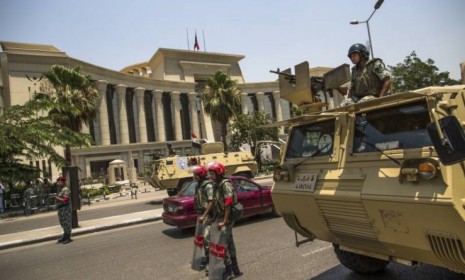Egypt's dissolved parliament: Is the revolution dead?
Egypt's high court has disbanded the first freely elected parliament in 60 years and blessed the presidential ambitions of Hosni Mubarak's former prime minister

Egypt's Supreme Constitutional Court, appointed by ousted President Hosni Mubarak, threw Egypt into turmoil on Thursday by effectively ordering the dissolution of the country's first popularly elected parliament in six decades, and striking down a law it passed that barred Mubarak's former prime minister from running in this weekend's presidential runoff election. Egypt's ruling military council (SCAF) said the election, between former Prime Minister Ahmed Shafik and Mohamed Morsi of the Muslim Brotherhood, will go on as planned, though whoever is elected might now have to lead the country without a parliament or a constitution — lawmakers were just starting the process of writing a new, post-Mubarak constitution. Is the bid to disband the Brotherhood-dominated parliament and boost Shafik the death knell for the already-embattled Tahrir Square revolution that swept Egypt and booted Mubarak from power?
The ailing revolution is dead: "Egyptian politics is prone to exaggeration and panic," but Thursday's high court rulings are the rare occasion where the hysteria is warranted, says Marc Lynch at Foreign Policy. After this military-judicial coup, Egypt now has no parliament, no constitution, a judiciary that's "become a bad joke," a discredited military, and no hope of "producing a legitimate, consensus-elected" president this weekend. I think "it's fair to say the experiment in military-led transition has come to its disappointing end."
"That's it for Egypt's so-called transition"
The Week
Escape your echo chamber. Get the facts behind the news, plus analysis from multiple perspectives.

Sign up for The Week's Free Newsletters
From our morning news briefing to a weekly Good News Newsletter, get the best of The Week delivered directly to your inbox.
From our morning news briefing to a weekly Good News Newsletter, get the best of The Week delivered directly to your inbox.
This is just another setback on a long path: Certainly, the "stunningly cynical" decision to dissolve parliament casts a pall over "Egypt's endlessly befuddling transition from authoritarian rule," says The Wall Street Journal in an editorial. But "it isn't a death knell for Egyptian democracy." In truth, the military state never gave up any real power, and now it's showcasing that, first by restoring martial law and then with these rulings. That's a setback to "an orderly and consensus-based transition to democracy," but the march will continue in fits and starts.
The court is only delaying the inevitable: The high court did just deal "a major blow to the pro-Sharia forces" that have dominated Egyptian politics since post-Mubarak elections started, says Robert Spencer at FrontPage Magazine, but it probably only managed to briefly "stave off the inevitable" Brotherhood-led Islamization of this Western-oriented secular nation. The public seems to want Islamist rule, and unfortunately for the West, and Egypt's Coptic Christians, it's what they'll eventually get.
"Egypt's High Court tries to stave off Sharia"
A free daily email with the biggest news stories of the day – and the best features from TheWeek.com
-
 ‘It’s good for the animals, their humans — and the veterinarians themselves’
‘It’s good for the animals, their humans — and the veterinarians themselves’Instant Opinion Opinion, comment and editorials of the day
-
 The world is entering an era of ‘water bankruptcy’
The world is entering an era of ‘water bankruptcy’The explainer Water might soon be more valuable than gold
-
 Powell: The Fed’s last hope?
Powell: The Fed’s last hope?Feature Federal Reserve Chairman Jerome Powell fights back against President Trump's claims
-
 The billionaires’ wealth tax: a catastrophe for California?
The billionaires’ wealth tax: a catastrophe for California?Talking Point Peter Thiel and Larry Page preparing to change state residency
-
 Bari Weiss’ ‘60 Minutes’ scandal is about more than one report
Bari Weiss’ ‘60 Minutes’ scandal is about more than one reportIN THE SPOTLIGHT By blocking an approved segment on a controversial prison holding US deportees in El Salvador, the editor-in-chief of CBS News has become the main story
-
 Has Zohran Mamdani shown the Democrats how to win again?
Has Zohran Mamdani shown the Democrats how to win again?Today’s Big Question New York City mayoral election touted as victory for left-wing populists but moderate centrist wins elsewhere present more complex path for Democratic Party
-
 Millions turn out for anti-Trump ‘No Kings’ rallies
Millions turn out for anti-Trump ‘No Kings’ ralliesSpeed Read An estimated 7 million people participated, 2 million more than at the first ‘No Kings’ protest in June
-
 Ghislaine Maxwell: angling for a Trump pardon
Ghislaine Maxwell: angling for a Trump pardonTalking Point Convicted sex trafficker's testimony could shed new light on president's links to Jeffrey Epstein
-
 The last words and final moments of 40 presidents
The last words and final moments of 40 presidentsThe Explainer Some are eloquent quotes worthy of the holders of the highest office in the nation, and others... aren't
-
 The JFK files: the truth at last?
The JFK files: the truth at last?In The Spotlight More than 64,000 previously classified documents relating the 1963 assassination of John F. Kennedy have been released by the Trump administration
-
 'Seriously, not literally': how should the world take Donald Trump?
'Seriously, not literally': how should the world take Donald Trump?Today's big question White House rhetoric and reality look likely to become increasingly blurred